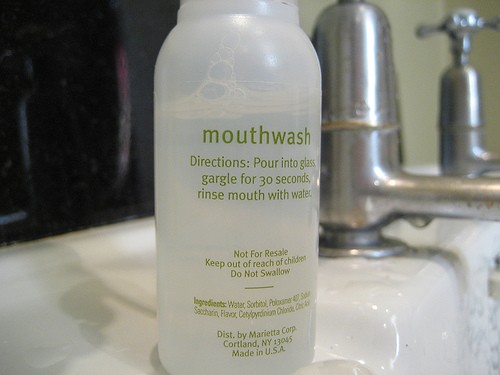
Using antiseptic solutions to boost oral hygiene increases possibility of getting a heart attack or stroke, scientists have warned.
Professor Amrita Ahluwalia from the Queen Mary University of London and colleagues found that mouthwash kills off the "good bacteria" essential to keep blood vessels relaxed, causing a sudden spike in the blood pressure, Daily Mail reported.
Blood pressure is a term used to measure the force of the blood flow against the walls of the blood vessels, each time the heart beats. Blood pressure readings that shows systolic pressure and diastolic pressure at or below 120 over 80 (120/80 mmHG) is considered to be normal, above 140/90 mmHG indicates high blood pressure, while readings below 90/60 mmHG is considered to be low BP. It is mandatory to keep blood pressure under control to ward off deadly diseases like heart attack, strokes, metabolic syndrome, aneurysm (swelling of blood vessels), kidney problems, memory problems, vision loss and heart failure.
In the study, blood pressure of the participants shot up within hours of using Corsodyl, a GlaxoSmithKline product used for treating gum disease.
"Killing off all these bugs each day is a disaster, when small rises in blood pressure have significant impact on morbidity and mortality from heart disease and stroke," Ahluwalia told the British daily.
For the study, researchers assigned 19 healthy people to use Corsodyl, twice a day. Rinsing mouth with the antiseptic solution was associated with between 2 and 3.5 units (mmgh) rise in blood pressure, "within one day," the authors said. Previous research has shown that a two point rise in the blood pressure can increase risk of dying from heart diseases and strokes by seven and ten percent respectively.
Chlorhexidine, an antiseptic element in the mouthwashes, destroys certain microbes that produce nitrite, thus interfering with the proper dilation of blood vessels and blood flow, researchers, while explaining the occurrence, said. After the mouthwash use, nitrite production in the mouth and blood nitrite dropped by 90 and 25 percent respectively.
Concerned with their findings, researchers urged people to avoid using mouthwashes if they don't have any dental problems. "We are not telling people to stop using antiseptic mouthwashes if they have a gum or tooth infection - but we would ask why anyone else would want to," Ahluwalia, added.
The study has been reported in the journal Free Radical Biology And Medicine.

















